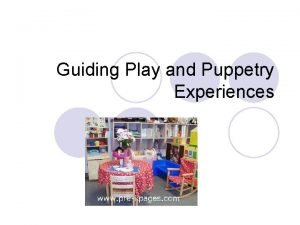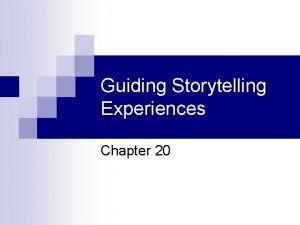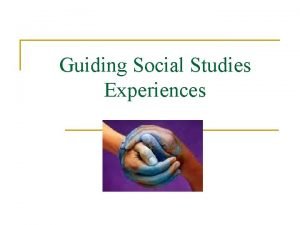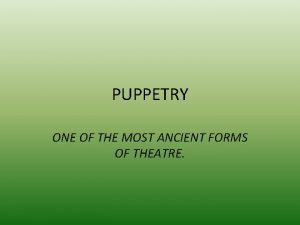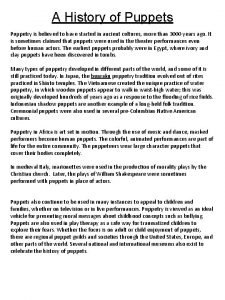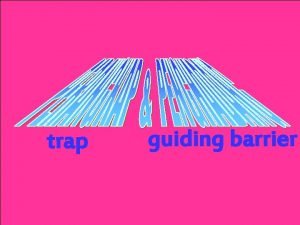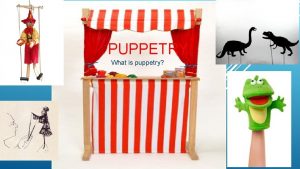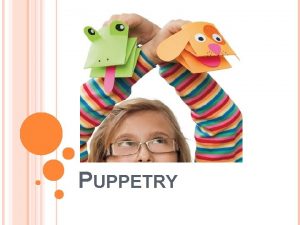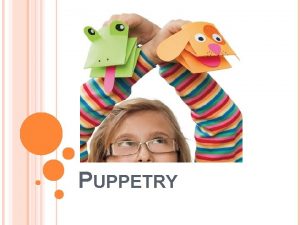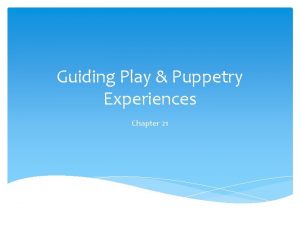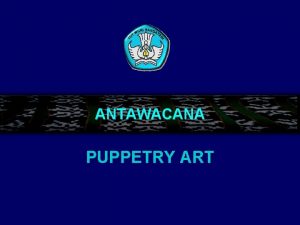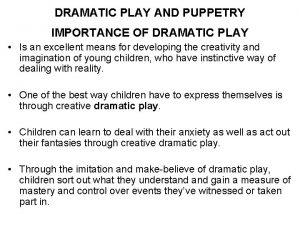Guiding Play and Puppetry Experiences Types of Play












- Slides: 12

Guiding Play and Puppetry Experiences

Types of Play l Dramatic play is a form of play in which a child imitates another person or acts a situation l Socio-dramatic play involves several children imitating others and acting out situations together ¡ Most complex form of play in early childhood settings

Types of Play, cont’d l Puppetry is another type of play that allows a child to imitate others ¡ Child places feelings and emotions he or she feels onto the puppet, which is known as projection

Stages of Play l Solitary play, or independent play, is exploratory in nature ¡ l Parallel play is when children play beside each other but not with each other ¡ l Typical of infants Typical of two-year-olds Cooperative play is play between two or more children ¡ As kids grow socially and emotionally, they begin playing with peers for short periods of time

Observing Dramatic Play l Have you ever observed children playing and witnessed them talking to dolls or puppets? l This is called personification. . . giving human traits to nonliving objects Ex. While speaking to a doll, a child might say, “Mommy is going to feed you now. ”

Stages of Material Use in Play Children move through three stages of material use in their play; not all reach second or third stage l Stage 1: Manipulative Stage l ¡ l Stage 2: Functional Stage ¡ l Child handles props Child will use prop as is intended, i. e. bottle for feeding Stage 3: Imaginative Stage ¡ Child does not need real prop; can think of a substitute

Role-playing l Role-playing allows children to try out a variety of roles l Children engaged in role-playing often give specific instructions for roles ¡ Examples: “You be the doctor and I’ll be the little girl” “I’ll play, but I have to be the bus driver. ”

Benefits of Dramatic Play l Increases cognitive (intellectual) development – imagination let them act out what they cannot be in real life l Increases problem-solving skills – kids make decisions and choices as they play l Increases language concepts – learn new names for equipment and new ideas from other kids

Benefits of Dramatic Play, cont’d l Increases physical development – sweeping floors, dressing skills, building structures l Increases social and emotional development – kids try out different social roles, learn how to get along, and act out repressed emotions

Play Themes l Themes vary; often focus on everyday situations kids experience l May imitate fixing cars, cooking dinner, painting a house

Teacher’s Role l Acts as a resource person who provides materials and space l Need to coach, model, reinforce l Need to schedule play periods that are long enough for children to carry out ideas

Equipment & Set-up l Quality of dramatic play is promoted through plenty of age-appropriate materials stored in accessible areas l Classrooms often have costume corners, housekeeping areas, outdoor play areas, and prop boxes ¡ Prop boxes – contain materials and equipment that encourage children to explore various roles; props often complement unit of study
 Guiding play and puppetry experiences
Guiding play and puppetry experiences Chapter 20 guiding storytelling experiences
Chapter 20 guiding storytelling experiences The importance of social sciences
The importance of social sciences Body puppetry
Body puppetry History of puppets
History of puppets All customers are served from a single focal serving point
All customers are served from a single focal serving point Contrived experiences edgar dale
Contrived experiences edgar dale Guiding principles of mtb-mle
Guiding principles of mtb-mle Mcpons
Mcpons Bias by photos captions and camera angles examples
Bias by photos captions and camera angles examples Guiding barrier
Guiding barrier Rest seat can be prepared
Rest seat can be prepared Priority of sendai framework
Priority of sendai framework
